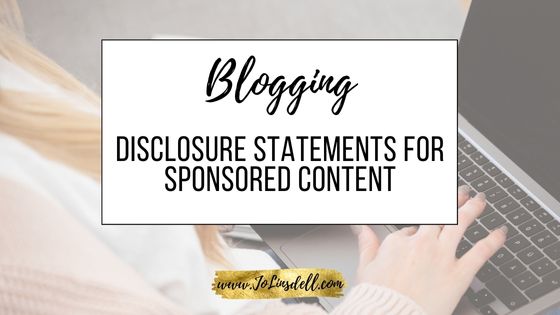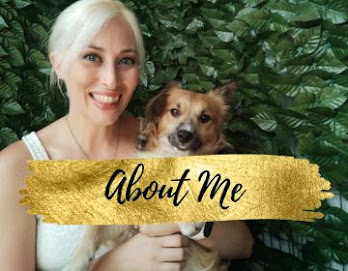Blogging
Disclosure Statements for Sponsored Content
Disclosure: The FTC Disclosure Provision is a law that requires influencers to disclose when they are being paid to promote a product or service. So please know that if I'm not making money through affiliate links/sponsored content on the post you're currently reading, it's an oversight on my part and will be corrected soon. Read the full disclosure about all the legal stuff here.
If you want to be taken seriously as a blogger you need to make sure you know about the rules related to sponsored content and affiliate links.
Rules About Disclosure Statements for Sponsored Content
FTC rules are very clear. If a blogger (or any other type of influencer) is receiving compensation for the content they are sharing they are legally obligated to let their readers know.
The FTC Act applies to product recommendations and other endorsements made on behalf of a sponsoring advertiser. So if an advertiser, or someone working for an advertiser, pays you or gives you something of value to have you mention that product/service you need to disclose it.
You can find full details in the FTC's Endorsement Guide.
You might also like: Things That Should Be In Every Blog Post
Why it's Important to Use Disclosures
There's obviously lots of legal reasons why you should be using disclosures on your blog. They protect you and the brands you work with.
If someone contacts you asking for a sponsored post to be published on your blog in exchange for payment but asks you not to include that it's a sponsored post this is a major red flag!
Apart from the legal obligations, there's also the moral obligations you have to your readers.
I personally want to to make sure that I'm honest and upfront with my readers. I want my readers to be able to trust me and so it's important that I'm not hiding anything. Transparency is a must.
By including disclosures on my posts I'm making sure it's clear that I may have been compensated in some way for the content I'm sharing. I might earn from a post via affiliate links or by the post itself being sponsored content. In either case, it will have no additional cost to my readers.
I sometimes get sent free products in exchange for a review. When this happens I always disclosure that I was given it for free. It in no way changes the content of my review. I'll always be honest when talking about products I review whether I got them for free or bought them for myself.
How To Legally Disclose Sponsored Content
When it comes to disclosures the most important thing is that it is obvious to your readers that you are being compensated for your content.
Include text like; "Sponsored by", "Paid for by", or "In partnership with" at the beginning of the post. You want to make sure it is clearly visible.
As one of my goals for my blog is to make more money via sponsored posts and affiliate links I decided to include the following disclosure at the start of all my blog posts:
Disclosure: The FTC Disclosure Provision is a law that requires influencers to disclose when they are being paid to promote a product or service. So please know that if I'm not making money through affiliate links/sponsored content on the post you're currently reading, it's an oversight on my part and will be corrected soon. Read the full disclosure about all the legal stuff here.
Find out more about disclosure statements:
Bloggers Goto explains why sponsored post links MUST be No-Follow
Privacy Policies contains great examples of different types of disclaimers
Thinking outside the sandbox has some great ideas about how to disclose that it's a sponsored post but also give it a personal touch.
Breezy has some funny and original examples of disclosure statements.
You might also like: Ways To Improve Your Blog DA Score
You might also like: Blogger VS Wordpress: The Pros and Cons

.jpg)



.jpg)
.jpg)











0 comments